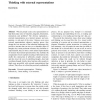Free Online Productivity Tools
i2Speak
i2Symbol
i2OCR
iTex2Img
iWeb2Print
iWeb2Shot
i2Type
iPdf2Split
iPdf2Merge
i2Bopomofo
i2Arabic
i2Style
i2Image
i2PDF
iLatex2Rtf
Sci2ools
AIS
2010
Springer
2010
Springer
Thinking with external representations
Why do people create extra representations to help them make sense of situations, diagrams, illustrations, instructions and problems? The obvious explanation-external representations save internal memory and computation--is only part of the story. I discuss seven ways external representations enhance cognitive power: they change the cost structure of the inferential landscape; they provide a structure that can serve as a shareable object of thought; they create persistent referents; they facilitate rerepresentation; they are often a more natural representation of structure than mental representations; they facilitate the computation of more explicit encoding of information; they enable the construction of arbitrarily complex structure; and they lower the cost of controlling thought--they help coordinate thought. Jointly, these functions allow people to think more powerfully with external representations than without. They allow us to think the previously unthinkable. Keywords External ...
AIS 2010 | Artificial Intelligence | External Representations | Obvious Explanation-external Representations | Ways External Representations |
Related Content
| Added | 08 Dec 2010 |
| Updated | 08 Dec 2010 |
| Type | Journal |
| Year | 2010 |
| Where | AIS |
| Authors | David Kirsh |
Comments (0)

